He attacked his predecessor Donald Trump for what he called "the big lie" - that he, Trump, really won the election in 2020, but was done out of it by skullduggery in the voting process.
It was the big lie, said President Biden, that has led to a rise in attacks on and intimidation of elected politicians, judges and civil servants for both the main political parties and none. The most recent attack being that on Paul Pelosi, the husband of the speaker of the House Nancy Pelosi.
But there have been lots of others too, and threats - according to the Capitol Police, who guard the politicians on Capitol Hill - there has been a near tenfold increase in threats against members of Congress since 2016. There were just over 9,000 incidents logged by the Capitol Police last year alone.
Last night, the President blamed Donald Trump for the increasingly ugly atmosphere in which US politics plays out these days. He intended to put the future of the country's electoral systems on the agenda for next week's general election.
Several big US media organisations have reported that more than half of the Republican candidates running for the House and Senate have made statements casting doubt on the integrity of the electoral system, especially when it comes to the 2020 Presidential Election.
What is less observed outside America is just how many so called "election deniers" are running for state level offices, which are also up for election next week. The same big media companies found the same rough percentage - more than half - of candidates for the State Governorships that are up for election next week have made statements that place them in the election denier camp.
Two such are Doug Mastriano in the battleground state of Pennsylvania, another is Kari Lake, the Republican candidate in Arizona. In both states, Biden flipped the votes from 2016, when Trump won in both states. Biden won narrowly in 2020 - the margin in Arizona just over 10,000 votes.
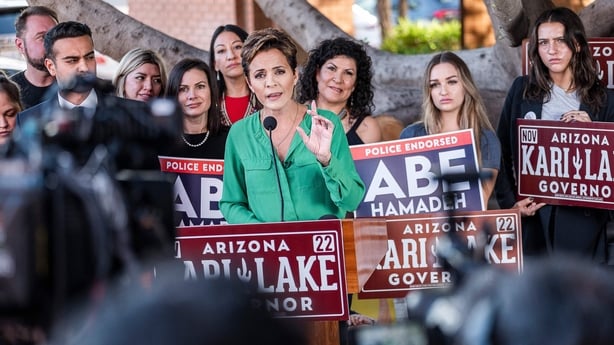
On election night two years ago, Fox News called Arizona for Biden early. The polling and elections expert at the station was right. But President Trump was not happy at hearing this negative news so soon in the night. A few weeks later, Chris Stirewalt, an editor at the station, was fired by Fox.
Trump and his allies, notably Rudy Giuliani, his lawyer (and former mayor of New York), pushed the notion that Trump had really won Arizona, but was undone by various alleged dirty deeds, notably counting votes that should not have been counted.
The big lie theory was goo, and given the amount of mud that was thrown, it is no surprise that some of it stuck. Arizona's election system is under intense scrutiny again, even though it was under intense scrutiny after the last election and was found to be clean, robust and accurate.
We need your consent to load this rte-player contentWe use rte-player to manage extra content that can set cookies on your device and collect data about your activity. Please review their details and accept them to load the content.Manage Preferences
There was even an "audit" of the election carried out by a Florida-based, republican leaning consultancy called Cyber Ninjas. It too reached the same conclusion: there was no fraud in Arizona - Donald Trump lost.
A two-year trawl through every ballot paper by the state's Attorney General Mark Brnivich did turn up some cases of personation - using somebody else's ballot paper to vote.
Mr Brnivich, a defeated candidate in the contest to be the Republican candidate for the Senate race in Arizona, told the top-rated current affairs show "60 Minutes " last Sunday that his office's exhaustive investigation found 12 cases of people voting when they should not have.
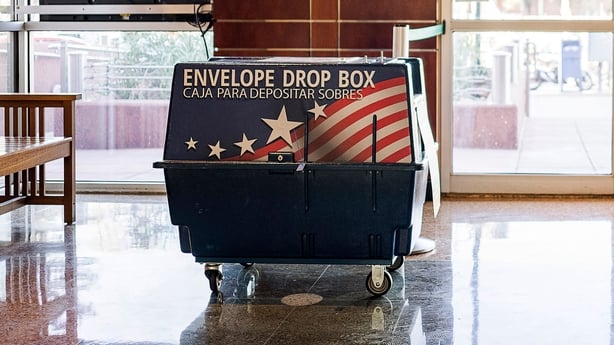
Twelve. In an electorate of 2.4 million in Maricopa County, the nation's second biggest voting district (after Los Angeles).
As Biden won out over Trump by more than 10,000 votes, the 12 would not have had any material impact on the outcome of the 2020 election. He dismissed the allegations of voting irregularities in most robust language.
But the allegations didn't go away. They just morphed into endless questions about ever more obscure aspects of the election system in Arizona, enticing election officials to play a kind of electoral "whack-a-mole", as new issues surfaced.
The process was encouraged by Mark Fincham, a retired police officer and four-time member of the Arizona House of Representatives. He even held an informal "hearing" in Phoenix so Rudy Giuliani could cast doubt on the election outcome. And he never stopped. Now Mr Fincham is himself on the ballot, running for the office of Secretary of State.
If he wins, he will have political control of the elections process in Arizona - the organisation of voting, and the certification of the outcome - notably the certification of the list of voters to the Electoral College that elects the US President. It was an attempt to stop the certification of those results on 6 January 2021 that led to the assault on the US Capitol that day.
Mark Fincham was filmed walking around the outside of the Capitol as the mob surged into the building, distinctive in a black cowboy hat. He was a longtime associate of the Oath Keepers, the paramilitary organisation made up of former police and military.
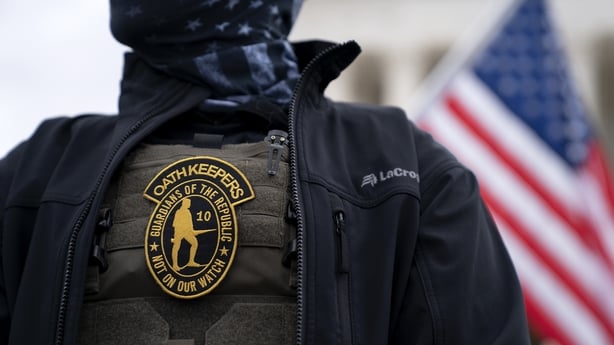
Some of the Oath Keepers breached the building in tactical gear. A group of them are currently on trial in Washington DC charged with sedition. In the last fortnight, Mr Fincham has started to deny that he was a member of the Oath Keepers.
He has continued to insist there are serious questions to be answered about the conduct of the 2020 election in Arizona. So too does Kari Lake, the Republican nominee for governor of the state. As does the Republican nominee for attorney general. The Republican Senate candidate started out making denialist sounds, but has more recently accepted that Joe Biden did indeed win the election. (It was a very close margin in Arizona, just over 10,000 votes).
Given all that you might think the officials who actually run the election in Arizona might be a bit concerned. Concerned that democracy is under attack. Concerned also that their own professional work is being called into question, usually based on zero actual evidence.
In the squat concrete block building in Phoenix that houses the Maricopa County election command centre - or count centre as we might call it - I saw the extraordinary effort being made to ensure the election is run with scrupulous adherence to the rules. But also to push back as vigorously as possible against the big lie claims of electoral fraud.
The centre is using publicity to fight the disinformation war. Because Arizona uses early voting, ballots are already being counted.
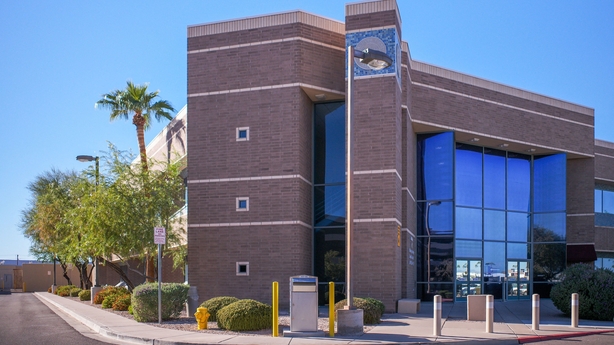
Since 2002, it has allowed anyone to apply for a mail in ballot. The measure is hugely popular, and getting on for 8% of the votes cast in this election are expected to be postal votes.
As of yesterday more than 800,000 mail-in ballots had been returned out of 1.4 million requested. A flood of forms is expected in the coming days.
We watched (and filmed) as the counting process was carried out. In one room teams of election workers opened the green ballot envelopes and unfolded the white printed ballots inside.
The forms are large as there are 80 jobs to be filled in these elections, mostly judges and other state level positions. Just filling in such a form will take time in a polling station, so to avoid long queues, most have opted into the mail in ballots.
Great care is taken to ensure traceability of each form. Signatures are scrutinised to see if they match with other documents held by the county. If they are okay, the forms go to another room to be scanned by a counting machine.
They are rather like the machines that count banknotes in banks. They are more accurate than human counting and they are faster.
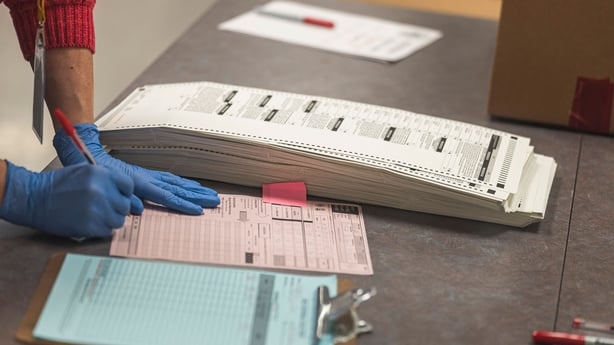
The early ballot results are not known to the humans at the count centre, only to the computer that collates the results. It is in a Perspex-walled room, so people can see it is not connected to the internet, so cannot be hacked from outside.
The first results from the mail-in ballots will be released early on Tuesday evening local time. But the results from the ballots cast on the day in person will take several hours later to count.
The late arriving mail-in ballots will not be counted for some time after that. It could be Saturday before a certified result is available from Arizona’s elections, but that won’t stop media experts calling the state for one party or another in each of the big races.
Still the eyes of the world will be on this process, because no matter how hard they try to run a god election, the officials are facing a post-truth climate in which anyone can say anything and pretty much get away with it.
All they can hope to do is counter as many lies as possible with as much factual information as possible. The count centre itself can be viewed by the public via web cams in each of the rooms.
So how, I wondered did the top officials react to having journalists like me, dispatched by European or Asian news organisations to snoop around and see of their systems are up to snuff?
"I have talked to a lot of reporters in past few weeks from around the world. And it has had a big impact on me actually, because it's made me realise that this isn't just about our country", said Bill Gates, the Chairman of the Board of Supervisors, the committee of elected officials that runs the county.
"We understand the eyes of our country are on Arizona and Maricopa County in particular, but it's made me realise that the eyes of the world are on Maricopa County, because America has been as the longest lasting democracy in the world right now. The rest of the world looks to us as a model for democracy. And we're very proud of that. I'm certainly proud of that.
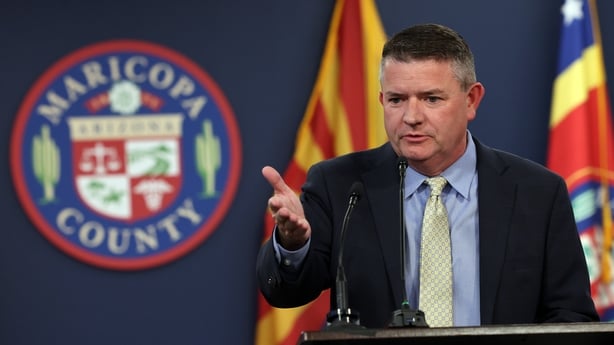
"And so it concerns me that all of you have come here with, I think, what I hear is that there is a real concern that there's something wrong with our democratic republic, and that Arizona and Maricopa County is a place where this sort of battle is taking place on the truth versus misinformation.
"So it reminds me of the importance of all this, but it concerns me and frankly, focuses me on the fact that we have to continue to do the right thing, because the rest of the world is watching especially those democracies around the world or maybe even those countries that aren't democracies, but hope to become one. And if they say if America, they can't get it right. Why would we think that we could in Kyrgyzstan or Belarus?"
For Stephen Richer, the Recorder of the County, essentially the head of archives and official papers, which includes ballot forms, the issue is both philosophical and vital.
"We're not only having a conversation about democracy, but we're having an epistemological crisis in many ways, that is focused right here in Maricopa County, where we can't even discern anymore what a solid, objective truth is," he said.
"We're not talking about what's the right minimum wage, or what's the right policy setting goal for this particular issue. We're talking about basically is two plus two equals four - because if you can't accept election results after all the tests, after all the professional audits, after all the court cases, after Mark Brnivich gets on "60 Minutes" and says this is all horse .... you got it! Then it ain't never happening.
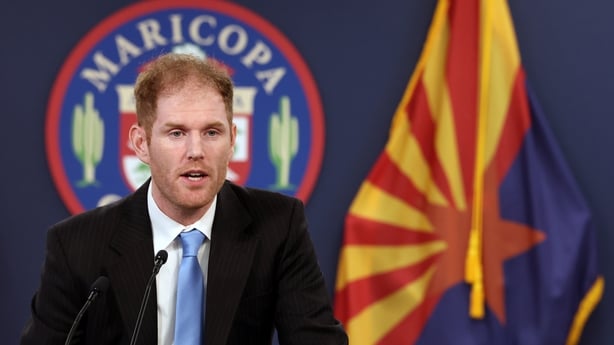
"So I really worry about that. And I worry about that in multiple contexts. And I think that has really come here to the elections arena in spades.
"And for that reason, I think that one of the things that we have been hopefully among the best in the country at is just relentlessly pushing back against these falsehoods - because we firmly believe that truth can be known.
"And if we say enough about the process, people will understand and we as a society can have a shared set of facts."
Despite phenomenal attention to detail and commitment to seeing the truth prevail, the officials also expect more lies and disinformation to wash across the Arizona elections next week, as some candidates seek to profit by refusing to accept a shared set of facts as basic as an election result.
And it won't be the only place in America where this will happen.





